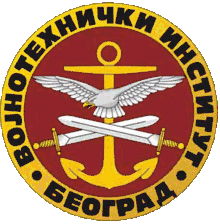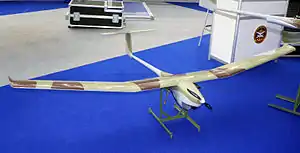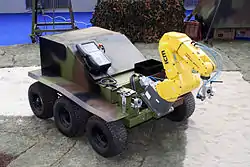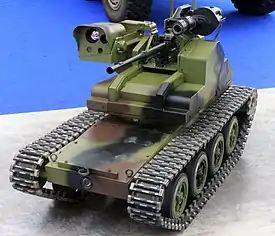Military Technical Institute Belgrade
Military Technical Institute Belgrade (Serbian: Vojnotehnički Institut Beograd; abbr. VTI) is a major Serbian aircraft and weapons designer, headquartered in Belgrade, Serbia and governed by the Serbian Ministry of Defence. VTI is a top-level military scientific research institution in Serbia, dealing with research and development (R&D) of new weaponry and military equipment as well as with upgrade of the inventory for all three services of the Army: Land Forces, Air Force and River flotilla.
 | |
| Type | R&D |
|---|---|
| Industry | Aerospace and defense |
| Founded | 3 November 1948 |
| Headquarters | Belgrade, Serbia |
| Products | Military aircraft Military Vehicles Rocket Weapons Classical Weapons Upgrades of weapons and military systems |
Number of employees | 500-600(estimated) |
| Parent | Ministry of Defence (Serbia) |
| Website | www |
Institute history
After the World War II, Federal People's Republic of Yugoslavia had a need to independently develop military technology and reduce dependence from foreign supply with given political situation of that time and future political course. By a decision of the Secretary of Defense and a proclamation by the President of FPRY Josip Broz Tito, VTI was founded in 1948 as the Military Technical Institute of the Land Forces ((Serbian: VTIkov - Vojnotehnički Institut kopnene vojske)) in Belgrade.
In 1973, the VTI was integrated with several smaller military research and development institutes.
In 1992 it assimilated the dissolved Aeronautical Technical Institute in Žarkovo, and minor parts (located in Serbia) of the Nautical institute (Serbian: Brodarski institut) from Zagreb, supposedly as an effort to reduce developing cost and maintenance. Since 1992 the Institute has changed name several times, reflecting the political changes in the country, starting with Technical institute of the Military of Yugoslavia.
Currently used name is Military technical institute Belgrade. Neither the translation of the name to other languages nor the corresponding acronym have ever been unambiguously defined; both VTI and MTI have been used in English-language documents, against the widely accepted practice not to translate such acronymes.
Today
The institute has 22 laboratories, and it is situated on 212 acres (86 hectares), with 177.000 square meters laboratories and office space, mostly in Bele Vode (sub-neighborhood of Žarkovo), on the premises of the former Aeronautical Technical Institute. The Institute obtained the certificates of compliance to the SRPS ISO 9001 and SRPS ISO/IEC 17025 standards.
Projects
The institute cooperates with Serbian Army, Technical Testing Center and Yugoimport SDPR in designing and testing new weapons systems.[1]
VTI (with assimilated predecessor institutes) developed more than 1300 military systems and weapons. However, not all of them entered use in the Yugoslav (later Serbian) Army. LThe list includes weapons and systems of other companies in which VTI was partly involved in some stage of developing and those systems are given with references. Institute was in charge for domestically produced weapons systems under licence and modification and modernization of such weapons with introducing new technologies and making new materials and tools for production. There are several new weapons developed from licences products that surpass originals in performance. Examples of licences used for domestic new weapons is a licence for tank T-72.
Aircraft
- Ikarus S-49
- Soko J-20 Kraguj
- Soko G-2 Galeb
- Soko J-21 Jastreb
- Soko J-22 Orao
- Soko G-4 Super Galeb
- Galeb G-4MD upgrade
- UTVA 75, (all developed by the Aeronautical Technical Institute)
- Kobac
- Lasta 95
- HN-45M Gama
- HN-45M Gama 2
Tanks
- M-84 Main Battle Tank (MBT) and A/AB/ABN/ABK/AS variants (1985 to present)
- M-84A – An upgraded version similar to the Soviet T-72M1 but with a significantly more powerful engine and additional armour plating
- M-84AB – Kuwaiti version of the M-84A
- M-84AB – The M-84AB fitted with land navigation equipment
- M-84ABK Command Tank – M-84AB version fitted with extensive communication equipment, land navigation equipment, and a generator for the command role
- M-84AI armored recovery vehicle (Yugoslavia and Poland) – During the mid-1990s Kuwait requested an armored recovery vehicle variant of the M-84A tank as part of the deal to buy a large batch of M-84A tanks.
- M-84AS – Upgrade package of the M-84A in service with the Serbian Army
- M-84AS1 – Adds additional armor, including explosive reactive armor, integrated day-night sighting system with thermal imager, command information system, a soft-kill active protection system, new radio system,Remote-controlled Weapons Station with 12.7mm machine gun, and CBRN protection equipment
Infantry Fighting Vehicles
- BVP M-80 Infantry Fighting Vehicle (IFV) (1979 to present)
- M-80A – Improved version with 320 hp engine, full production
- M-80A1 or SPAT 30/2 – Improved version with a dual 30mm gun system called "Foka". Prototype only.
- M-80A/98 – Further improvements of M-80A1 with new "Vidra" turret
- M-80A KC – Company commander's vehicle
- M-80A KB – Battalion commander's vehicle
- M-80A VK - Turretless commander's vehicle
- M-80A Sn – Medical, no turret. Single oblong hatch in the roof and single rear door. Carries 4 stretcher patients or 8 seated patients.
- M-80A LT – Tank hunter with six AT-3 launchers
- Sava M-90 – SA-13 SAM version, designated Strela-10MJ, prototype
- MOS – Self-propelled mine layer
- M-80AK/M-98A – New gun turret with 30 mm M86 cannon or 30 mm dual feed M89 cannon
- M-80AB1 – Advanced armour, turret gun control equipment, optronics package, smoke grenade launchers and the ability to mount and launch the most recent 9M14 Malyutka missile variants
Armoured Personnel Carriers
- OT M60 Armoured Personnel Carrier (1962 to 1979)
- BOV 4 x 4 (1980's to present)
- BOV VP
- BOV M11
- BOV M15
- BOV APC
Reconnaissance Vehicles
- BOV M11
- Kurjak
Air Defence Vehicles
- BOV 3
- BOV 30
- BOV AX Hybrid
Engineering Vehicles
- VIU-55 Munja (T-55 Conversion)
- M-84AI
Field artillery
Self-propelled artillery
Multiple rocket launcher
- LRSVM Morava,[4]
- M-87 Orkan
- M-96 Orkan 2
- M-77 Oganj
- M-63 Plamen
- Nimr 107mm MLRS[5][6]
Mortars
- Mortar 60mm M57
- Mortar 60mm M70
- Mortar 60mm M95 Long Range
- Mortar 60 mm M06C (Commando)
- Mortar 82mm M69A
- Universal Mortar UB M52
- Light mortar 120mm M74
- Light mortar 120mm M75
- Mortar 120mm M95 Long Range
Anti-tank Weapons
- Bumbar[7]
- M79 Osa
- Zolja
- M-80A LT
- POLO M-83
- Malyutka-2T
- M90 Stršljen
Anti-Aircraft Weapons
- Sava M-90
- SPAT 30/2
- BOV-3
- BOV-30
- Strela 2M2J
- Sava
- Strela-10M
Mines and Mine layers
- Self-Propelled Minelayer MOS
- TMA – 4
- TMRP – 6
Military trucks
- FAP 1118
- FAP 2026
- FAP 2228
- FAP 3232
- FAP 3240
- Zastava NTV
Turrets, cupolas and RCWS
- M91
- M86
- M86/06
- M10 RCWS
- 12,7mm RCWS
- M20 RCWS
Unguided missiles
- M-77
- Plamen A
- Plamen D
Air-to-surface missile
- Grom A
- Grom B
- LVBF-250
Surface to surface missiles
Projectiles and large calibers ammunition
- 105mm HE ER-BB M02
- 105 mm HE ER
- 125mm APFSDS–T M88
- 155mm HEERFB–BB M03
Rifles,guns,sub-machine guns and snipers
- Zastava M21
- M97
- M97K
- Zastava M70
Electronics, optoelectronic stations, fuzes, homing heads, sensors, etc
MIP 11,[11] TV Homing Heads for Guided missiles, Laser Homing Heads for Guided missiles, System for acoustic source localization - HEMERA,[12] inertial guidance systems for missiles, Explosive reactive armour M99, Battery command and control system for Nora B-52, M07G Mortar ballistic computer, Tank engine protection from wrong start-up, system for automatic control and jamming of mobile telephony, Radio jammers against remotely controlled improvised explosive devices, Software packages for command and control of air defense assets from the command and control centers, MOMS surveillance-sighting system [8]
Upgrades modernization and modifications
Neva-M1T, SA-341, Upgraded Howitzer 105 mm M56/33, Upgraded Howitzer 105mm M101/33, Programs for modernization of the T-55 family of tanks,including their Chinese derivatives, as well as of the T-72 family of tanks, Upgraded BTR-50
Specialized laboratories
- Aerodynamics
- Spatial Forms and Lengths Measuring
- Experimental Modal Analysis, Vibration and Balancing Analysis
- Experimental Strength
- Experimental Ballistics
- Testing of Solid Propellant Rocket Motors
- Power-Generating Materials
- Servo-Systems
- Hardware in the Loop (HIL) Simulation and Telemetry
- Electro-Inertial Sensors
- NBC Protection
- Electromagnetic Compatibility
- Radio-Relay Systems and Multiplex Equipment
- Micrography
- Optoelectronics
- Guidance and Control
- Electric Power Devices
Fairs and scientific-technical gatherings
Institute exhibited in Partner Serbia armaments fairs, participated in IDEX UAE fair under SDPR and organized OTEX scientific-technical gathering.
Subdivisions
- Overhaul direction
- Technical overhaul institute Cacak - (Serbian: TRZ Čačak) http://www.trzcacak.rs/en/index.html
- Technical overhaul institute Kragujevac - (Serbian: TRZ Kragujevac) http://www.trzk.co.rs/English/first.htm
- Aeronautical Plant "Moma Stanojlović" Batajnica (Serbian: VTRZ "Moma Stanojlović" Batajnica)
Documentary and publishing activity
Making of technical documentation, films and books represents an important part of VTI as publisher, it represents institute output and quantifier of more than sixty years involvement in R&D missions. The Institute possesses technical documentation for over 1300 items of weaponry and defense equipment developed through institute history that are introduced in service in the armed forces. This documentation being intellectual property of MoD, it has an outstanding value and use for future projects.
Media
Robot Milos in action - story about development and use, presented by official Serbia RTS state defense TV channel "Dozvolite" - Little Milos - robot
See also
References
- "YouTube". www.youtube.com. Retrieved 2019-11-22.
- "Robot "miloš" srpski vojnik budućnosti (FOTO)". www.novosti.rs. Retrieved 16 July 2018.
- http://www.vti.mod.gov.rs/index.php?view=actuality&type=projects&category=1&id=78
- http://www.vti.mod.gov.rs/index.php?view=actuality&type=projects&category=1&id=75
- Mounir Kaddouri (28 October 2012). "NIMR 107mm Multi Rocket Launcher System". Retrieved 16 July 2018 – via YouTube.
- Haider, Haseeb. "First MLRS unit delivered". www.khaleejtimes.com. Retrieved 16 July 2018.
- https://www.youtube.com/watch?v=u-9ubouHzkc - testing of Bumble Bee in wind tunnel of MTI
- http://www.vti.mod.gov.rs/index.php?view=actuality&type=news&id=315
- http://www.pupin.rs/organizacija-imp/imp-racunarski-sistemi/#infra
- "Partner 2015: Program modernizacije radara Instituta "Mihajlo Pupin" - Tango Six". 29 July 2015. Retrieved 16 July 2018.
- http://www.vti.mod.gov.rs/index.php?view=actuality&type=projects&category=1&id=76
- http://www.vti.mod.gov.rs/index.php?view=actuality&type=projects&category=1&id=73


